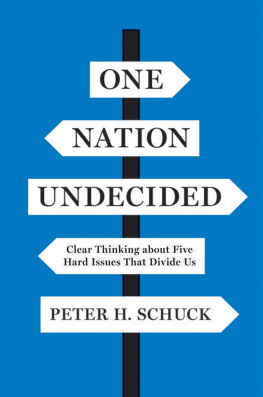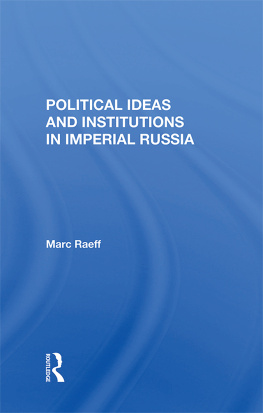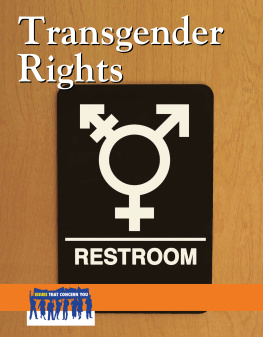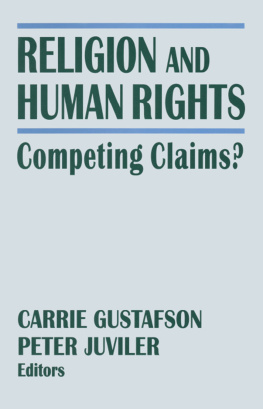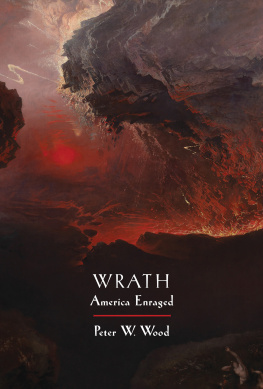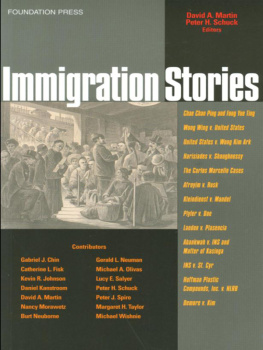
ONE NATION UNDECIDED
ONE NATION UNDECIDED
CLEAR THINKING ABOUT FIVE HARD ISSUES THAT DIVIDE US
PETER H. SCHUCK
PRINCETON UNIVERSITY PRESS
Princeton & Oxford
Copyright 2017 by Princeton University Press
Published by Princeton University Press,
41 William Street, Princeton, New Jersey 08540
In the United Kingdom: Princeton University Press,
6 Oxford Street, Woodstock, Oxfordshire OX20 1TR
press.princeton.edu
Jacket art and design by Alex Robbins
All Rights Reserved
Library of Congress Cataloging-in-Publication Data
Names: Schuck, Peter H., author.
Title: One nation undecided : clear thinking about five hard issues that divide us / Peter H. Schuck.
Description: Princeton, New Jersey : Princeton University Press, 2017. | Includes bibliographical references and index.
Identifiers: LCCN 2016039948 | ISBN 9780691167435 (hardback)
Subjects: LCSH: Political cultureUnited States. | PovertyPolitical aspectsUnited States. | United StatesEmigration and immigrationPolitical aspects. | Campaign fundsUnited States. |Affirmative action programsUnited States. | Religion and politicsUnited States. |
BISAC: POLITICAL SCIENCE / Public Policy / General. | POLITICAL SCIENCE / Civics & Citizenship. | LAW / Government / General.
Classification: LCC JK1726 .S37 2017 | DDC 320.60973dc23 LC record available at https://lccn.loc.gov/2016039948
British Library Cataloging-in-Publication Data is available
This book has been composed in Miller
Printed on acid-free paper.
Printed in the United States of America
10 9 8 7 6 5 4 3 2 1
I DEDICATE THIS BOOK to the many social scientists whose resourcefulness and industry in digging out the facts bearing on hard issues make works of synthesis like this one possible
CONTENTS
ACKNOWLEDGMENTS
I UNDERTOOK THIS PROJECT for two reasonsto deepen my own understanding of some of the central social policy issues of the day and to communicate what I have learned to other conscientious citizens who want to dig into them more deeply and need a balanced, objective synthesis to do so.
Along the way, a number of distinguished experts in these fields were kind and patient enough to answer my questions, refer me to relevant sources, and in some cases offer detailed comments on draft chapters in their areas of specialization. They include Hank Aaron, Steve Ansolabehere, Adam Cox, Bob Doar, Nicole Garnett, Rick Garnett, Ron Haskins, Steve Heyman, Sandy Jencks, Ray LaRaja, Chip Lupu, David Martin, Larry Mead, Shep Melnick, Michael Olivas, Nate Persily, Jon Rauch, Cristina Rodriguez, Marc Rosenblum, Rick Sander, Belle Sawhill, David Shapiro, Laura Tach, Jack Weinstein, and Robin Wilson. I am greatly indebted to these wise, generous, busy, and exceedingly well-informed scholars. Their colleagueship inspires my own.
Four law students provided excellent research assistance, especially during the early stages of my work: David Barillari (Yale Law School class of 2016), Rachel Hecht (Yale Law School class of 2017), Marissa Roy (Yale Law School class of 2017), and Tony Cheng (NYU Law School class of 2018), who also prepared the index. I presented an early version of the introductory chapter to the Berkeley Law School faculty. NYU Law School has provided me an institutional home away from my Yale home in New York City for more than fifteen years through the deanships of John Sexton, Ricky Revesz, and now Trevor Morrison. Their generosity, and that of their fine faculty, have been remarkable and invaluable.
Parts of are adapted from my article, Affirmative Action: Past, Present, and Future, originally published in the Yale Law & Policy Review, volume 20, issue 1, 2002. Much of the material on religious diversity was published in 2003 by Harvard University Presss Belknap Press in my book Diversity in America: Keeping Government at a Safe Distance and is reproduced here, with some updates, and with the permission of the original publishers. Specific page numbers can be found in the endnotes to these discussions.
Peter Dougherty, the visionary director of Princeton University Press, his senior editor Eric Crahan, and others on the Presss staff provided discerning intelligence and other valuable support during the books gestation period. My thanks as well to the anonymous outside readers whose comments made this a better book. Alas, I alone am responsible for any errors.
Finally, I thank Marcy, my beloved wife of fifty years. Without her, as the quip goes, I would have written this book much more quickly.
November 2016
ONE NATION UNDECIDED
CHAPTER 1
INTRODUCTION
YOU ARE A SERIOUS, well-educated voter. You read print and online media, listen to the views of opinion leaders and organizations that you trust, discuss current events informally with interested friends, and generally try to keep up with current events. You want to participate responsibly in the democratic process through which the policies that govern us are formed, but you find this difficult. Busy with your family, work, and other private commitments, you dont have much spare time to navigate the daunting complexity of the substantive policy issues. Social groups and peer pressure urge you to take clear positions on these issues. You might feel more comfortable if you could conscientiously do so. But you feel uneasy in taking firm positions on these important issues because, in all honesty, you know that you havent given them all that much thought or done your homework. So what is a conscientious but understandably distracted citizen like you to do?
I wrote this book for you. It is about hard public issues and how Americans should think about them before deciding where they stand. The success of our deliberative democracyin which We the People and our representatives really do decide how such issues are resolveddepends on citizens knowing what they are talking and voting about.
Is more public debate on hard issues needed? What do I mean by clear thinking about issues? What is the quality of todays debates? How much must citizens know about the issues in order to think clearly about them, and how realistic is this? What can this book hope to contribute to these debates?
This chapter answers these questions in general, and the chapters that follow get down to specifics. But which ones? The list of domestic policy decisions on which Americans sharply disagree with one anotherin the voting booth and in conversationsis very long. No single person could explicate most of them. To do so would require far more knowledge, technical skill, time, and patience than any individual (certainly this one) possesses.
The readers patience is short, so I focus my analysis on five domestic policy issues: poverty; immigration; campaign finance; affirmative action; and conflicts between religious and secular values. Why these? Reasonable people will disagree about the most important issues facing the nation. The firstpovertyis an enduring challenge to the American dream. The next twoimmigration and campaign financeare perennially controversial, especially during election campaigns. The debate over affirmative action remains as robust as ever, even after the U.S. Supreme Court upheld its constitutionality in 2016. (The Court did not endorse its policy merits and the decision was a narrow one, limitedas the majority emphasizedto Texass sui generis plan.) The final issue, which I shall call religious accommodation as a shorthand, has always been controversial in our public life, and its prominence today is especially high in light of two recent Supreme Court decisions, discussed in .
Next page
